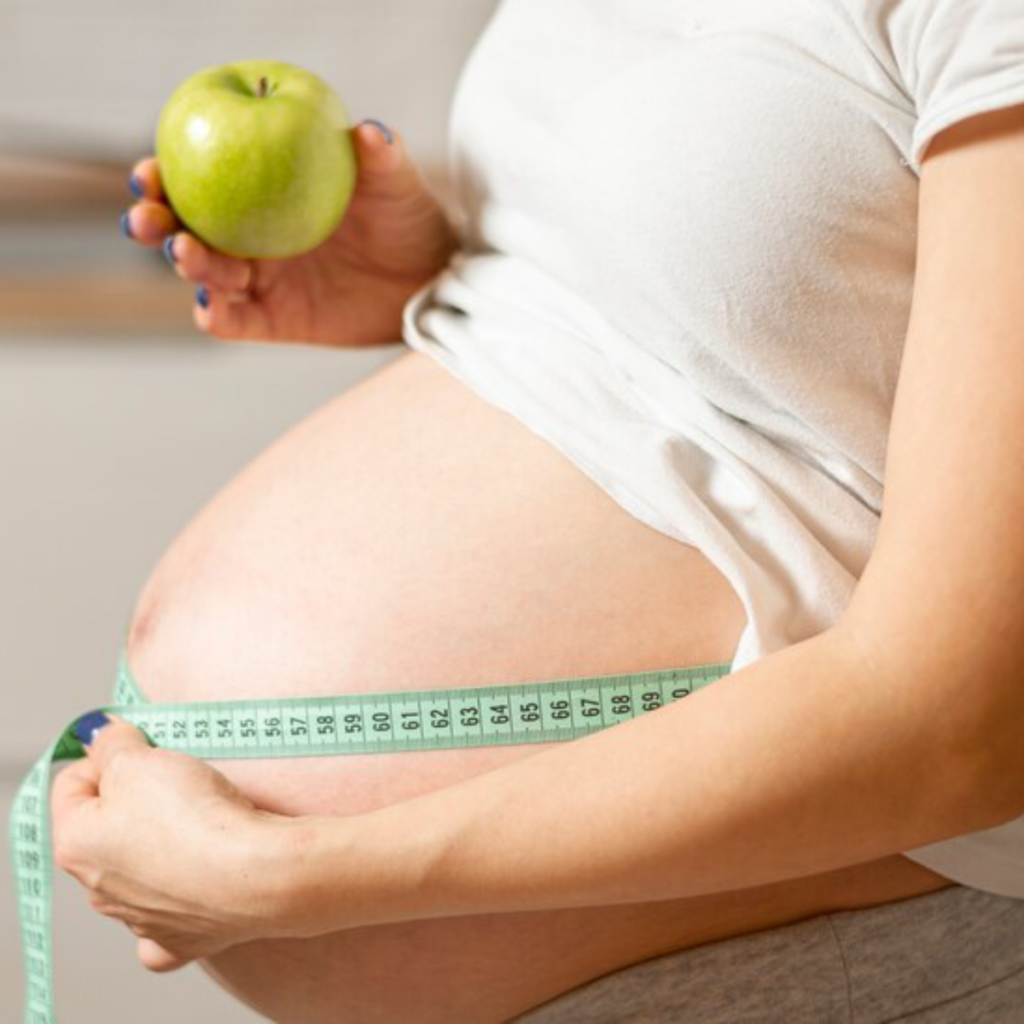Discover the connection between weight gain during pregnancy and postpartum back pain.
How Does Weight Gain During Pregnancy Contribute to Postpartum Back Pain?
Throughout pregnancy, weight gain is a natural and necessary process. However, many expectant mothers are often unaware of the potential consequences it may have on their bodies, particularly when it comes to postpartum back pain. In this article, we will delve into the various ways in which weight gain during pregnancy can contribute to postpartum back pain, and explore effective prevention and management techniques.

Understanding the Basics of Weight Gain During Pregnancy
Before we dive into the connection between weight gain and postpartum back pain, let’s take a moment to understand the fundamentals of weight gain during pregnancy. During the nine-month journey, it is normal for women to gain weight to support the growth and development of the baby. This weight gain is a result of factors such as increased blood volume, amniotic fluid, and of course, the growing baby.
But how much weight gain is considered “normal” during pregnancy? Let’s find out.
The Normal Weight Gain Range in Pregnancy
The amount of weight gained varies from woman to woman. On average, expectant mothers gain between 25 and 35 pounds during pregnancy. This weight gain is distributed across different areas of the body, including the breasts, the baby itself, the placenta, and the uterus.
It’s important to note that weight gain is not linear; it typically occurs more rapidly in the second and third trimesters. However, excessive weight gain can lead to a variety of postpartum health complications, including back pain.
Factors Influencing Weight Gain in Pregnancy
While weight gain during pregnancy is generally considered a healthy and expected occurrence, several factors can influence the amount of weight gained:
- Pre-pregnancy weight: Women who are underweight before pregnancy may need to gain more weight, while those who are overweight may need to gain less.
- Multiple pregnancies: Women carrying twins or multiples may need to gain more weight to accommodate the additional babies.
- Physiological factors: Hormonal changes, genetics, and metabolism can all play a role in weight gain during pregnancy.
Additionally, lifestyle choices such as diet and exercise can impact weight gain during pregnancy. A balanced diet that includes essential nutrients and regular physical activity can help ensure healthy weight gain.
Furthermore, it’s worth mentioning that weight gain during pregnancy is not solely about the number on the scale. The distribution of weight gain can also vary among women. Some may gain more weight in specific areas, such as the hips or thighs, while others may experience more overall weight gain.
Now that we have a grasp on weight gain during pregnancy, let’s explore how it can contribute to postpartum back pain.
The Connection Between Pregnancy Weight Gain and Postpartum Back Pain
Postpartum back pain can be attributed to different factors, and weight gain is undoubtedly one of them. As the baby grows and the expectant mother gains weight, her center of gravity shifts forward. This change in balance can result in increased stress and strain on the spine, leading to discomfort and pain.
However, the impact of weight gain on postpartum back pain goes beyond just the shifting center of gravity. Let’s explore in more detail how the extra weight affects the spine and the body’s balance during pregnancy.
The Role of Extra Weight on the Spine
During pregnancy, the spine has to cope with the extra weight placed on it. This additional burden can cause the natural curves of the spine to become exaggerated, leading to muscle tightness and pain in the lower back.
As the baby grows, the mother’s body undergoes significant changes to accommodate the developing fetus. The spine, being the support system of the body, bears the brunt of these changes. The added weight strains the muscles, ligaments, and joints in the back, making them more susceptible to discomfort and pain.
Furthermore, the added weight can compress the intervertebral discs, the cushion-like structures between the vertebrae. This compression can lead to pain and potentially contribute to conditions such as herniated discs, where the inner portion of the disc protrudes through the outer layer, causing nerve impingement and further exacerbating back pain.
How Pregnancy Changes Your Body’s Balance
Weight gain also affects the body’s balance during pregnancy. As the uterus expands, it shifts the mother’s center of gravity forward, causing her to adjust her posture to maintain stability. This adjustment can exert strain on the back muscles and ligaments, resulting in discomfort or pain.
Moreover, the pregnancy hormone relaxin loosens the ligaments in the pelvic area to prepare for childbirth. While this is necessary for the birthing process, it can also contribute to instability and discomfort in the lower back. The loosened ligaments can lead to increased joint mobility, which, combined with the extra weight, can put additional stress on the spine and its supporting structures.
Additionally, the changes in body shape and posture during pregnancy can affect the alignment of the spine. As the baby grows, the mother’s abdomen protrudes, causing the lower back to curve more than usual. This increased curvature, known as lordosis, can strain the muscles and ligaments in the lower back, leading to pain and discomfort.
Understanding the connection between pregnancy weight gain and postpartum back pain is crucial for expectant mothers. By being aware of the potential impact of weight gain on their spine and body’s balance, they can take proactive steps to manage and alleviate back pain during and after pregnancy. Consulting with healthcare professionals, engaging in appropriate exercises, maintaining good posture, and using supportive devices can all contribute to a healthier and more comfortable pregnancy journey.
The Science Behind Postpartum Back Pain
In addition to the physical changes caused by weight gain during pregnancy, hormonal fluctuations also play a role in postpartum back pain.
When a woman is pregnant, her body undergoes a series of hormonal changes that are necessary for the development and growth of the fetus. Hormones such as relaxin, progesterone, and estrogen flood her body, preparing it for the upcoming childbirth. While these hormones serve vital functions in facilitating childbirth, they can also have an impact on the musculoskeletal system, including the back.
The Impact of Hormonal Changes on Back Pain
One of the key hormones involved in pregnancy is relaxin. As the name suggests, relaxin helps to relax and loosen the ligaments and joints in the body. This increased laxity is essential for allowing the pelvis to expand during childbirth. However, it can also have unintended consequences for the spine.
With the ligaments and joints becoming more flexible and lax, the stability of the spine can be compromised. This can lead to misalignments and imbalances in the vertebrae, which in turn can cause pain and discomfort in the back. The hormonal changes can also affect the discs in the spine, making them more susceptible to pressure and compression.
The Role of Muscle Weakness and Tension in Back Pain
During pregnancy, it is common for certain muscles to weaken due to lack of exercise or inactivity. The growing belly and the additional weight can put strain on the back muscles, leading to weakness and fatigue. This muscular imbalance can further contribute to postpartum back pain.
Additionally, the physical and emotional demands of pregnancy can result in stress and tension in the muscles. The body goes through significant changes, and the added stress can cause the muscles to tighten and become tense. This tension can exacerbate any existing back pain and make it more difficult for the muscles to support the spine effectively.
It is important to note that postpartum back pain is a common issue that many women experience after giving birth. While the hormonal changes and muscle weakness/tension play a significant role, there can be other factors at play as well, such as poor posture, improper lifting techniques, and the physical demands of caring for a newborn.
Understanding the science behind postpartum back pain can help women navigate this challenging period and seek appropriate treatment and support. It is crucial to consult with healthcare professionals who specialize in postpartum care to develop a comprehensive plan for managing and alleviating back pain.
Prevention and Management of Postpartum Back Pain
Postpartum back pain is a common concern for many new mothers. The physical changes that occur during pregnancy, such as weight gain and hormonal shifts, can put strain on the back and lead to discomfort. Fortunately, there are steps expectant mothers can take to prevent and manage postpartum back pain.
Safe Exercise During Pregnancy
Engaging in safe and appropriate exercise during pregnancy can help strengthen the muscles that support the spine, reducing the risk of back pain. Activities such as walking, swimming, and prenatal yoga can be beneficial. Walking is a low-impact exercise that can be easily incorporated into a daily routine. It not only helps improve cardiovascular health but also promotes the flexibility and strength of the back muscles. Swimming is another excellent option for pregnant women as it provides a weightless environment that relieves pressure on the spine. Prenatal yoga focuses on gentle stretching and strengthening exercises that target the core and back muscles. However, it is crucial to consult with a healthcare professional before starting any exercise routine during pregnancy to ensure it is safe and suitable for individual circumstances.
Posture and Ergonomics for Pregnant Women
Maintaining good posture and practicing proper ergonomics throughout pregnancy can alleviate unnecessary strain on the back. Simple adjustments can make a significant difference in preventing postpartum back pain. When sitting, using a support pillow can help maintain proper spinal alignment and reduce pressure on the lower back. Additionally, it is important to avoid slouching and instead sit up straight with the shoulders relaxed. When standing, distributing weight evenly on both feet and avoiding prolonged periods of standing can help prevent back pain. Proper lifting techniques are also essential during pregnancy to avoid unnecessary strain on the back. It is advised to bend at the knees and use the leg muscles to lift objects, keeping them close to the body for added support.
Furthermore, creating an ergonomic work environment is crucial for pregnant women who spend long hours sitting at a desk. Using an adjustable chair that provides lumbar support can help maintain proper posture and reduce the risk of back pain. Positioning the computer monitor at eye level and using a keyboard and mouse that are at a comfortable height can also contribute to good ergonomics.
In conclusion, preventing and managing postpartum back pain requires a proactive approach. Engaging in safe exercise, maintaining good posture, and practicing proper ergonomics are all essential steps in reducing the risk of back pain during and after pregnancy. By taking these measures, expectant mothers can focus on enjoying the precious moments with their newborns without the burden of back discomfort.
Seeking Medical Help for Postpartum Back Pain
While most cases of postpartum back pain can be managed with lifestyle changes, there are instances when medical intervention becomes necessary.

When to Consult a Doctor
If the back pain is severe, persistent, or accompanied by other concerning symptoms, it is essential to consult a healthcare professional. Persistent back pain can be a sign of an underlying condition that requires medical attention.
Treatment Options for Severe Postpartum Back Pain
For severe cases of postpartum back pain, healthcare professionals may recommend various treatment options depending on the specific diagnosis. These may include physical therapy, chiropractic care, pain medication, or even surgery in rare cases. Proper diagnosis and guidance from healthcare professionals are crucial in developing an individualized treatment plan.
In conclusion, weight gain during pregnancy can contribute to postpartum back pain. The additional weight and changes in body balance place increased stress on the spine, while hormonal changes and muscle weakness can further exacerbate discomfort. By understanding the factors at play and taking proactive measures, expectant mothers can prevent and manage postpartum back pain, ensuring a more comfortable and enjoyable transition into motherhood.



